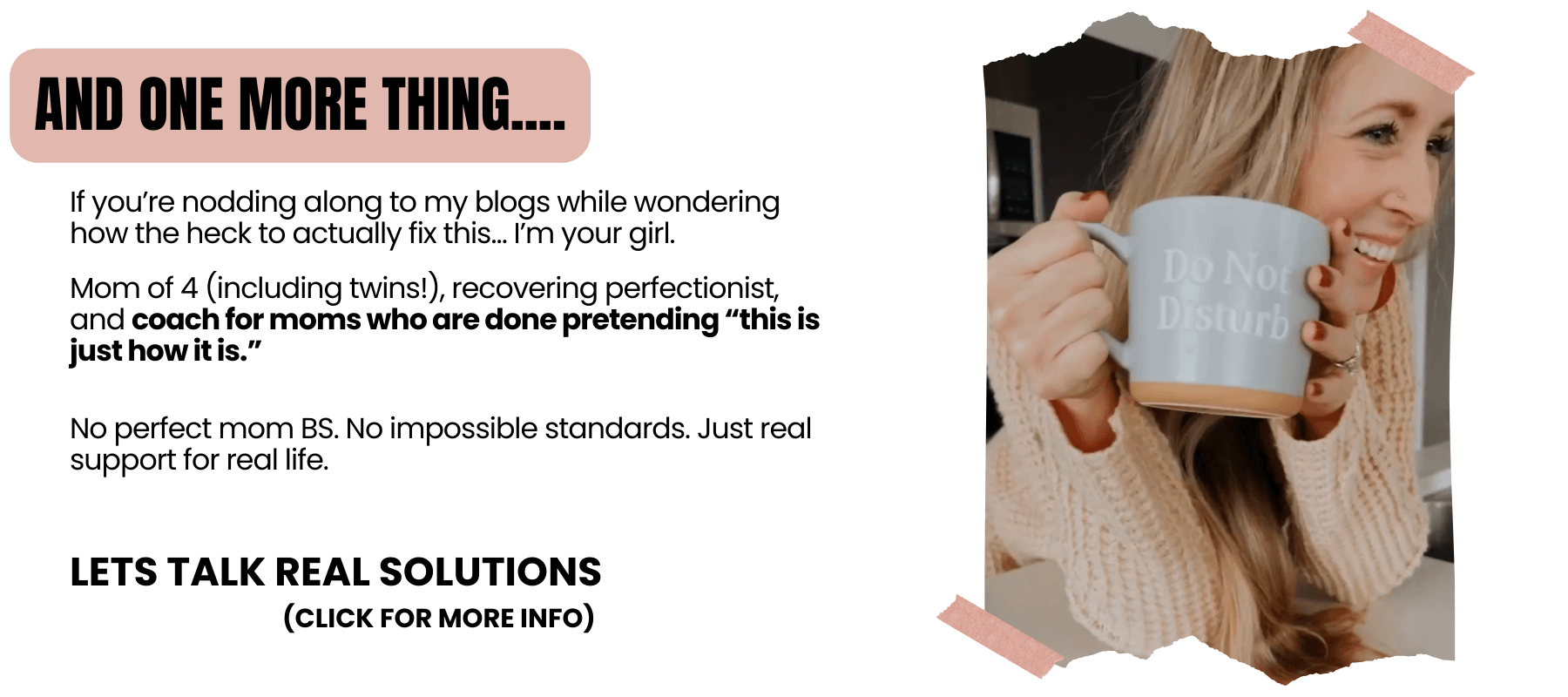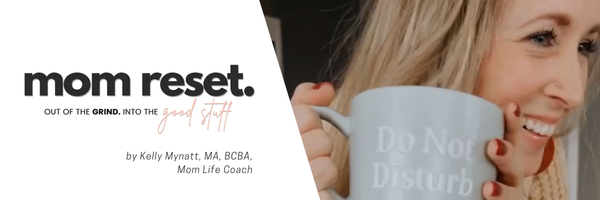Qualities of a Good Mom: The Truth From a Mom Of 4 & Behavior Analyst
Looking up ‘qualities of a good mom’ at 2 AM? Let me guess - you’re wondering if you’re doing this right. As a mom of four and behavior analyst, I’m about to share something controversial: The qualities that actually make a good mom might surprise you (and challenge everything you’ve seen on social media).
After years of studying human behavior, working with hundreds of moms, and raising my own four kids, I can tell you that most of what we’ve been taught about being a ‘good mom’ is absolute garbage.
Let’s talk about what REALLY matters - and why the qualities you might think make you a ‘bad mom’ are actually signs you’re doing this right.
7 Real Qualities of a Good Mom
(and why those “perfect mom” standards are actually hurting our kids):
Emotional Authenticity (Yes, Including the Messy Parts)
From a behavioral perspective, here’s something fascinating: when we try to hide all our negative emotions, we’re actually teaching our kids that some feelings are unacceptable. That’s not just my professional opinion - I’ve seen this play out both in research and in my own kitchen.
Let me give you a real example: About a year ago, during what felt like the hundredth meltdown of the day, I sat down on the kitchen floor and cried. Right there, in front of my kids. And you know what happened? That moment taught them more about emotional regulation than any “calm down” chart ever could.
What this quality looks like in real life:
• Showing your kids that big feelings are normal
• Apologizing when you lose your cool (because you will)
• Having honest conversations about emotions
• Demonstrating how to move through difficult moments
2. Boundary Setting (Even When It Feels Hard)
Here’s what years of behavioral analysis has taught me: kids who never hear “no” struggle to develop crucial life skills. But here’s what nobody tells you - setting boundaries isn’t just good for your kids, it’s essential for preventing mom burnout.
The science shows us that clear, consistent boundaries actually make kids feel safer. Think about it: would you feel secure on a playground with no fence, or one with clear limits where you could play freely within them?
What healthy boundary-setting looks like:
• Saying no without guilt
• Creating consistent routines
• Maintaining personal limits
• Teaching respect for others’ boundaries
3. Intuitive Decision-Making
Here’s something fascinating I’ve observed both as a behavior analyst and a mom of four: maternal intuition isn’t just some fluffy concept - it’s your brain processing thousands of data points about your child that you’ve collected over time.
When you have that gut feeling about your child needing something different than what the parenting books suggest? That’s actually your behavioral observation skills at work. You’re the expert on your child’s patterns, triggers, and needs.
What trusting your intuition looks like:
• Making decisions based on your child’s unique needs
• Adapting “expert” advice to fit your family
• Recognizing your child’s behavioral patterns
• Responding to what works, not what “should” work
4. Strategic Self-Care
Let’s talk behavioral science for a minute: When a mom is consistently depleted, her stress responses are heightened, affecting every interaction with her children. This isn’t about bubble baths - it’s about maintaining the emotional bandwidth to respond rather than react.
I see it in my own home: The days I prioritize my basic needs are the days I can handle the tenth spilled drink without losing my cool. It’s not magic - it’s neuroscience.
What real self-care looks like:
• Meeting your basic needs without guilt
• Creating systems that support your wellbeing
• Modeling healthy self-respect for your kids
• Understanding that your state affects their state
5. Adaptive Responsiveness (Because Every Kid and Day is Different)
Listen, if there’s one thing I’ve learned from raising four kids, it’s that what works today might not work tomorrow. And what works for one child might be completely wrong for another. Being a good mom isn’t about sticking to one perfect method - it’s about being willing to pivot when something’s not working.
Remember that time I tried to use the same bedtime routine for my twins? Yeah… that was a disaster. Because even though they shared a womb, they’re completely different kids with different needs. Being able to adapt and respond to each child’s unique needs isn’t just helpful - it’s essential.
What this looks like in real life:
• Adjusting your approach based on each child
• Being flexible with routines when needed
• Learning from what doesn’t work
• Meeting your kids where they are
6. Present Over Perfect (This One’s Game-Changing)
Can we talk about those Pinterest-worthy sensory activities and Instagram-perfect mom moments for a second? Because here’s what I tell my clients: Your kids don’t need elaborate activities or picture-perfect days. They need YOU - present, engaged, and real.
Some of our best moments happen when things don’t go as planned. Like when we completely botch the birthday cake but end up having the best time laughing about it together. Or when the carefully planned activity gets abandoned for an impromptu dance party in the kitchen.
What being present looks like:
• Putting down the phone sometimes
• Following your child’s lead
• Creating connection in simple moments
• Letting go of “perfect” expectations
7. Emotional Recovery Skills (Because We All Lose It Sometimes)
Let’s get real about something: Every mom loses her cool sometimes. I don’t care what the Instagram perfect moms show you - we ALL have those moments. What makes you a good mom isn’t never messing up - it’s what you do after.
Just last week, I snapped at my kids over something totally minor (because I was running on 4 hours of sleep and cold coffee). But instead of spiraling into mom guilt, I did what I teach my clients: I took a breath, apologized sincerely, and turned it into a teaching moment about managing big feelings.
What healthy recovery looks like:
• Genuine apologies when needed
• Open conversations about emotions
• Showing kids how to repair relationships
• Growing through challenging moments
Here’s What Really Makes a Good Mom
After working with hundreds of moms and raising four kids of my own, here’s what I know for sure: Being a good mom isn’t about being perfect. It’s about being real, present, and willing to grow.
The mom who:
• Shows up authentically (messy bun and all)
• Trusts her gut about what her kids need
• Takes care of herself without apology
• Keeps trying, even on the hard days
That’s the mom your kids actually need.
A Final Note From Someone Who Gets It
If you’re reading this and thinking “but I mess up so often” or “I don’t feel like I’m doing any of this right,” I want you to hear something: Those thoughts alone - that desire to do better, to be better - they’re actually proof that you’re already a good mom.
But here’s the thing - knowing this and living it are two different stories. That’s exactly why I do what I do.
Because you shouldn’t have to figure this out alone. Whether you’re:
• Struggling with mom guilt
• Feeling overwhelmed by everyone’s opinions
• Looking for support that actually gets it
• Ready to feel confident in your mothering
I’m here to help you embrace your version of being a good mom - messy, real, and exactly what your kids need.
Ready to transform how you see yourself as a mom? Let’s talk. Book your free consultation today, and let’s create a motherhood that feels good for both you AND your kids.


















